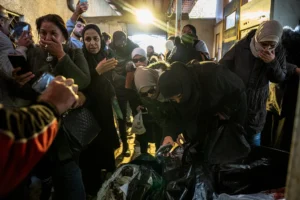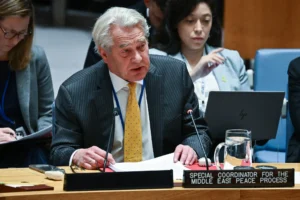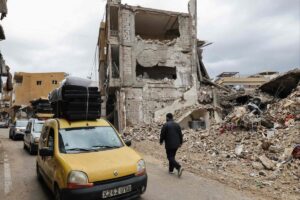The attacks came as Israel’s military has been pounding an area just outside the Lebanese capital with some of the heaviest waves of bombardment in months.
Two waves of Israeli airstrikes hit Lebanon’s capital on Sunday, rare attacks inside Beirut that come as Israel’s military has been pounding areas outside the city where Hezbollah holds sway.
Israel’s intensified push appears aimed at pressuring the Lebanese government and Hezbollah to accede to terms for a cease-fire for Lebanon worked out between Israeli and American officials, in what Israeli analysts describe as a strategy of “negotiations under fire.”
Lebanon’s Health Ministry said at least six people were killed in Sunday’s strikes in Beirut, the first to hit the city in weeks. The attacks rattled residents, reviving fears that the city could be consumed by the larger war.
The infrequent strikes inside the capital have tended to target individuals belonging to Hezbollah. On Sunday, the first attack killed Mohammed Afif, the head of Hezbollah’s media office, according to Hezbollah and the Israeli military.
As the de facto spokesman of Hezbollah, Mr. Afif was one of the group’s few remaining figures with a public profile. His role had gained more prominence in recent weeks after Israel killed Hezbollah’s leader, Hassan Nasrallah, in September along with much of the group’s top command and leadership.
The Israeli military said late on Sunday that it had killed Mr. Afif in a “precise, intelligence-based strike,” calling him Hezbollah’s chief spokesman and saying he was “directly involved in advancing and executing Hezbollah’s terrorist activities against Israel.”
On Sunday evening, the Israeli military again struck in Beirut in the area of Mar Elias, according to Lebanon’s Health Ministry, which said that at least two people were killed and 22 wounded in the strike. The attack ignited a large fire in the building that was hit, sending plumes of smoke billowing into the neighborhood. There was no immediate comment from Israel’s military about the second strike.
The strike in Beirut earlier on Sunday destroyed a seven-story building in the neighborhood of Ras al-Naba, Lebanon’s state-run news agency reported. It said that search teams were working to rescue a number of people trapped under the rubble and that Mr. Afif was “coincidentally present” when the building was struck. The Lebanese Health Ministry said on Sunday that four people were killed in the attack on Ras al-Naba.
The building housed the Lebanese headquarters of the Arab Socialist Baath party, a small political faction aligned with Hezbollah. In a statement, the party said that its leader, Ali Hijazi, was not in the building at the time of the strike.

The explosion set off panic and confusion in the city. People rushed out into the street, some screaming, others trying to reach people by phone. Smoke and dust filled the air and gunfire rang out as multiple ambulances rushed to the scene, where a crowd had gathered.
Um Ahmad, who gave only her first name, stood across from the building, her three young daughters huddled behind her. She said that she, her husband and their six children were staying in a nearby apartment along with dozens of others displaced by the war. The moment they heard the blast, they rushed out of their building in fear.
“We heard a loud boom and left immediately,” she said.
Earlier Sunday, the Israeli military said it had conducted “intelligence-based strikes” against Hezbollah on the Dahiya, an area just south of Beirut where the militant group holds sway. A spokesman for the Israeli military, Avichay Adraee, said on Sunday that Israel had struck 50 targets in the area over the past week.
Abu Hussein had fled the Dahiya and taken a job as a security guard at a building in Beirut a few weeks ago. The building where he works was the one that was hit first on Sunday.
After the strike, Mr. Hussein stood nearby in a daze. His head bandaged, and streaks of blood ran down his neck.

“The building was nearly empty” when the strike hit, Mr. Hussein said, as medics tended to his wounds.
Mr. Afif had appeared in public in recent weeks to speak to reporters at news conferences in the Dahiya. During one news conference last month, Mr. Afif told reporters that Hezbollah had taken responsibility for an aerial attack that targeted the home of Israel’s prime minister, Benjamin Netanyahu. When Israeli warnings of an imminent strike sent journalists scrambling to gather their equipment and leave, Mr. Afif told them, “The bombardments don’t scare us, so how should the threats scare us?”
A week ago, Mr. Afif said at a news conference that Hezbollah had not yet received any official proposal for a cease-fire deal — though he noted that there had been “contacts between Washington, Moscow, Tehran and other capitals” on the issue since the election of former President Donald J. Trump.
Hezbollah, he cautioned, remained “ready for a long war.”
Israel began an intensified military campaign against Hezbollah in September, nearly a year after the group began firing rockets into Israel in solidarity with Hamas in Gaza. The offensive set off a humanitarian crisis in Lebanon, displacing nearly a quarter of the population and buckling the country’s health system.
Lebanon’s Health Ministry said on Sunday that Israeli attacks had killed 29 people on Saturday, bringing the death toll since the fighting between Israel and Hezbollah began in October 2023 to more than 3,480 people. The ministry does not distinguish between civilians and combatants.
The campaign against Hezbollah initially focused on southern Lebanon, where Israel’s military said it sought to stop the group from being able to fire rockets across the border. But the military operations have expanded in recent weeks to include cities and towns across the country, including some far from that border. And Hezbollah has maintained its ability to launch rockets into Israel.
The Israeli military said on Sunday that about 35 rockets were fired into the country from Lebanon, setting off alert sirens in the area around Haifa, Israel’s main northern port city, and other places. Some of the rockets were intercepted by Israel’s air defenses, and others fell in open areas. One person was moderately injured, according to Israel’s emergency medical services.





Be First to Comment